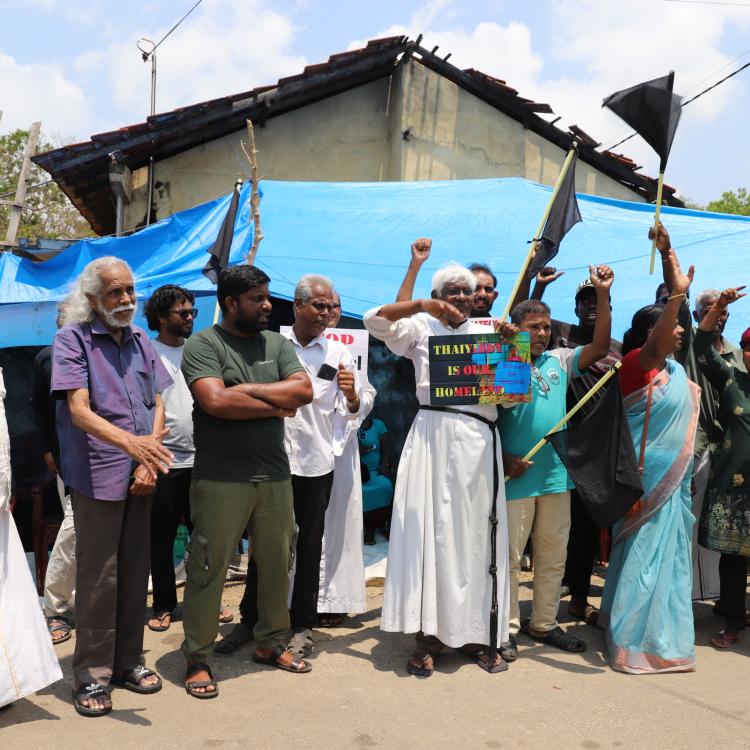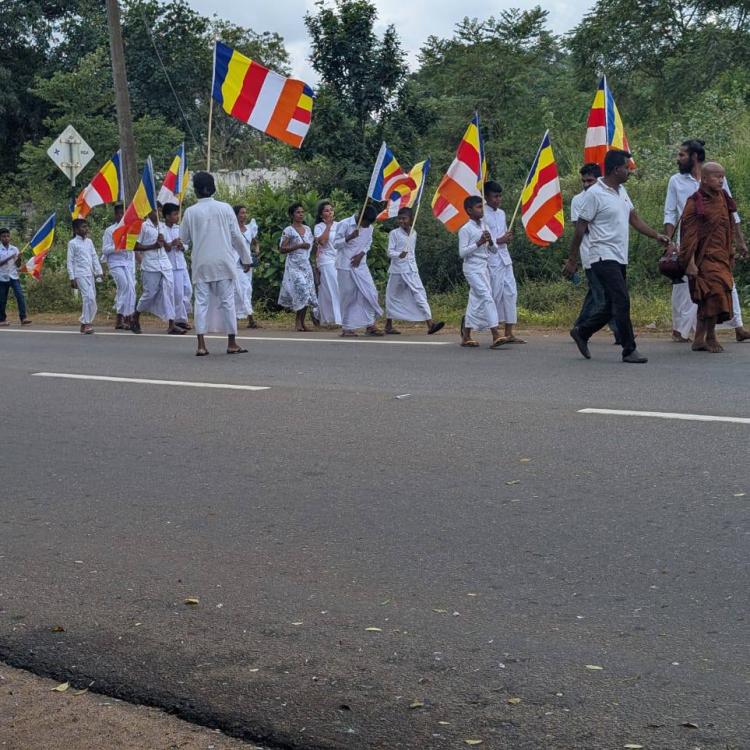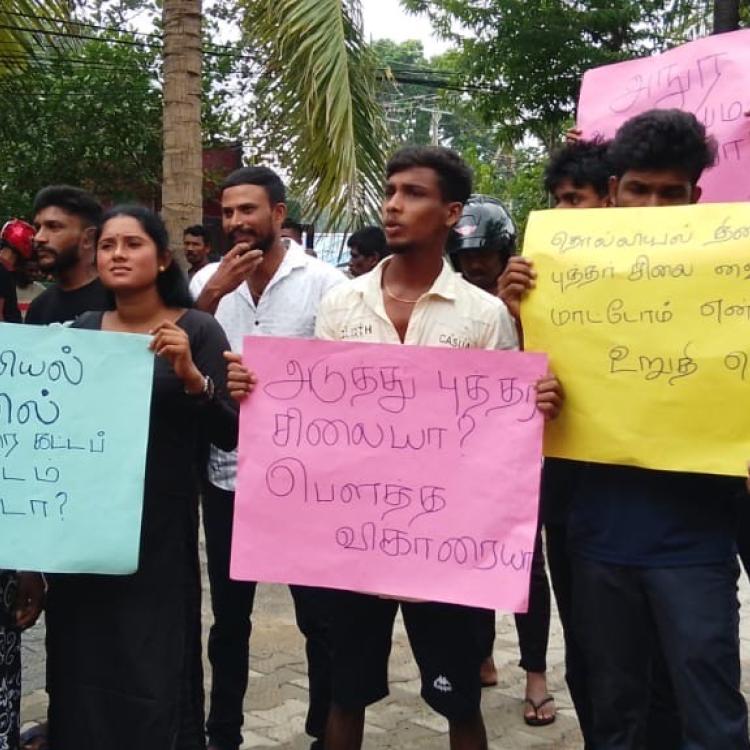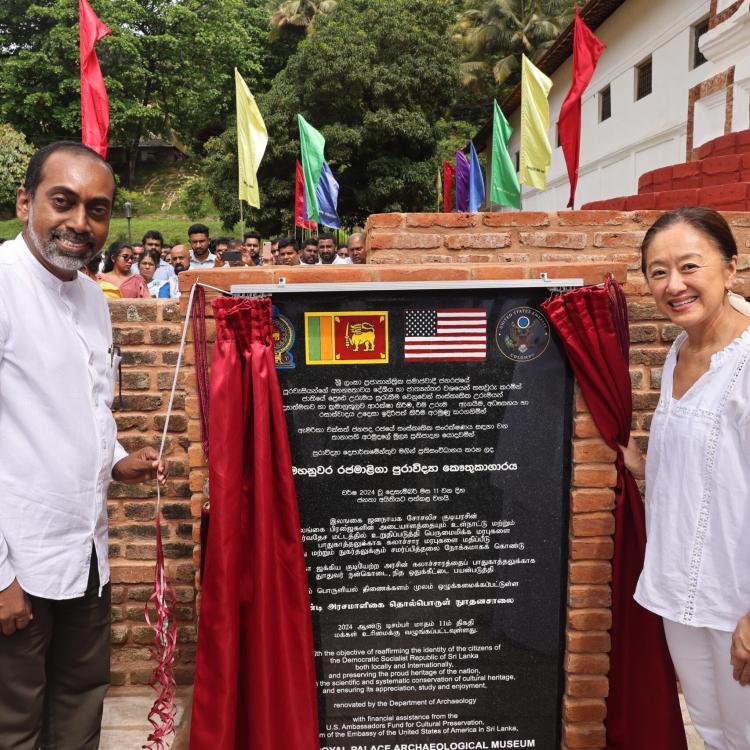.jpeg)
Speaking in Vavuniya on April 13, Selvarajah Kajendran, General Secretary of the Tamil National People’s Front (TNPF) and former Member of Parliament, launched a scathing critique of Selvam Adaikalanathan for supporting the Sri Lankan government’s budget and legitimising the state-sponsored settlement in Vavuniya district of 1,500 Sinhala families under the so-called ‘Lower Malwathu Oya project’.
Launched in 2019 by the then Sri Lankan Prime Minister Ranil Wickremesinghe, the large-scale irrigation and water management project in the basin of the second largest river on the island includes development of new settlements, including in the Tamil district of Vavuniya. The lower reaches of the river is known in Tamil as 'Aruvi Aaru' as it flows through Vavuniya before reaching the ocean in Mannar.
Kajendran accused Adaikalanathan of serving as a shield for the Sri Lankan state on the international stage, while betraying the Tamil nation by endorsing measures that advance Sinhala colonisation across the Tamil homeland.
Yet he expressed hope in the current group of Tamil election candidates, citing the growing strength of the Tamil nation’s voice—especially through the emergence of a new generation of principled candidates.
Reiterating the TNPF’s long-held position, Kajendran declared that the Tamil national question cannot be resolved within the confines of a unitary state. He expressed joy over the rise of the Tamil National Assembly, describing it as a reflection of the strength drawn from the sacrifices of their fallen heroes, noting that the Tamil people’s struggle is rooted in the belief that they must fight to live with dignity, not as slaves. "Every decision made has been responsible and firmly grounded in the reality of the Tamil people's existence and their right to self-determination", said Kajendran.
Highlighting recent incidents of resistance, Kajendran referred to the Tamil people’s successful mobilisation to prevent the construction of a Buddhist temple on Vedukkunari hill —despite ongoing legal battles and the brutal repression of youth activists by the Department of Archaeology and police. “Had they not fought back, Vedukunari would have suffered the same fate as Kurunthoormalai,” he warned.
He criticised the Tamil National Alliance (TNA) for its role in enabling Sinhala settlements post-2009, noting that in 2013, under the Rajapaksa regime, colonisation efforts were advanced in Kokkasankulam. By 2015, at an event in Vavuniya’s Saivaprakasa College, TNA leaders—including M.A. Sumanthiran and Adaikalanathan—stood alongside then-President Maithripala Sirisena to publicly offer their support to Sinhala settlers.
Kajendran stressed that to put an end to this cycle of betrayal, it is vital for the people to rally behind leadership that remains uncompromising in its principles. “If the people place their trust in us, we will ensure their voices are respected in council chambers—and that the international community cannot continue to ignore our cause,” he said, urging support for Tamil nationalist leaders like Gajendrakumar Ponnambalam, noting that their influence would only grow with a clear public mandate.
“The truth must be taken to the people,” he added. “Those who are committed to the Tamil cause are with us.” Kajendran named the Democratic Tamil National Front, the Tamil National Party, Arundhavalagan, Aingaranesan, Srikantha, and S. Sivajilingam as leaders who have rejected Adaikalanathan’s budget vote and now stand united under a common Tamil nationalist front.
The controversial Lower Malwathu Oya project, under which Sinhala families are being settled in Vavuniya, has been framed by the state as a water management initiative. Yet, Kajendran pointed out that while Muslim families have lost land in the process, the real objective is the systematic colonisation of Tamil lands using state resources.
He also denounced NPP leader and Sri Lankan President Anura Kumara Dissanayake, accusing him of embodying a more insidious form of Sinhala nationalism. “He supported the same war crimes as previous regimes and helped with military recruitment,” Kajendran said. “Now they are trying to rebrand him as a progressive leader, using Tamil collaborators to shift the discourse from genocide to ‘development’. It is nothing less than a betrayal.”
“We must establish Tamil self-rule. Remove racist forces and their agents from our midst. Support those who stand firm and uphold the people’s mandate,” Kajendran concluded. “Only then can we begin to resolve the national question on our own terms—by reclaiming local power and affirming our right to govern ourselves.”




